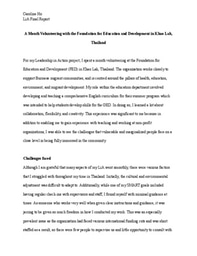What went well?
Throughout this week, I have learned more as I have become more immersed in local culture. I got much more comfortable riding on a motorbike on the main road, and was able to see much more of the surrounding area as a result. In doing so, I have witnessed the biases that Burmese people experience on a day-to-day basis in Thailand, in addition to the systemic inequities that I learned about last week. For instance, when some of the older students took me and a few other volunteer interns to the Bang Niang Market, they kindly helped to barter with the stall owners so that the volunteers could pay “local prices” rather than the “foreigner prices”. However, when the owner of one booth realized that the student was Burmese and not Thai, she rescinded her original discounted price and became angry and hostile towards the student. This instance demonstrated how systemic inequalities, such as Burmese people only being permitted to take up certain jobs, can permeate to result in other forms of discrimination at the individual level. As I have spent more time volunteering at FED, I have also gotten to know my students on a more personal level, learning more about their personal circumstances and journeys as migrants. Such instances have made my experience at FED so much more valuable than anything I could have learned as a student in a classroom.
What could have been done differently?
While my experience as a volunteer at FED has been deeply rewarding and educational, I feel that some aspects of the organization are a bit scattered due to a lack of resources. I had originally come in wanting to also help with the migrant development section in addition to helping with education. However, due to its loss of funding with cuts to USAID, the migrant development section has been greatly reduced in capacity; thus, although they are in need of more help, taking time to train volunteer interns (let alone me, who only has two weeks left here!), would only further hinder their work, and therefore would not be productive for the organization. This has made me realize the importance of fundraising and bilateral and multilateral aid; without it, there would not only be no people left to run the organization, but also significantly hinder the organization’s ability to make a substantial impact.
What did I learn about myself when working with others?
I learned about the importance of being adaptable. While I spent my first week of my LiA drafting a curriculum to use, this had to change quite a bit over my first week in Thailand as I had to adjust it to make it suitable for the students’ ages and skill levels. This week, my co-teacher and I found out that we had to prepare the students to take a skills assessment to see what their English levels were on the CEFR (Common European Framework of Reference for Languages) scale. This meant that we had to pivot our plans again to include more components. In addition to grammar, speaking, and listening, we added reading and writing sections that would prepare them for the assessment. We also began writing the test itself, which was an interesting and new experience for me. While there have been several curveballs encountered with new requirements added suddenly, I feel that my co-teacher and I have been good with pivoting our plans accordingly.
What did I learn about leadership?
Leadership requires listening to and accepting diverse input. While I have been working primarily with one other intern in developing lesson plans and teaching them, we have been lucky to be working with several other students from universities who are also completing internships in different departments at FED. While they may have less experience with regards to education, we always spend time talking to each other at lunch. Surprisingly, this discourse has been one of the most effective means of problem-solving with issues relating to our English classes. While the other volunteer interns are studying vastly different things, have varying areas of expertise, and are from different countries, their input has been very helpful, as it has provided a fresh perspective. Leadership benefits greatly from this diversity, as new approaches are often those that are most helpful.
What do I want to develop or focus on next?
I hope to become more familiar with the local culture and contexts to better understand how I can personally contribute to FED. As I came to Thailand knowing relatively little about the language and culture, I was a bit put-off by and hesitant about my involvement. Overall, volunteering in foreign countries is something I have always been wary of as it seems overbearing in some aspects. During my time here, I have learned how significant of an impact FED makes, and I hope to contribute with more initiatives in collaboration with local people who have a better understanding of the issues that migrant communities here face.


Please sign in
If you are a registered user on Laidlaw Scholars Network, please sign in